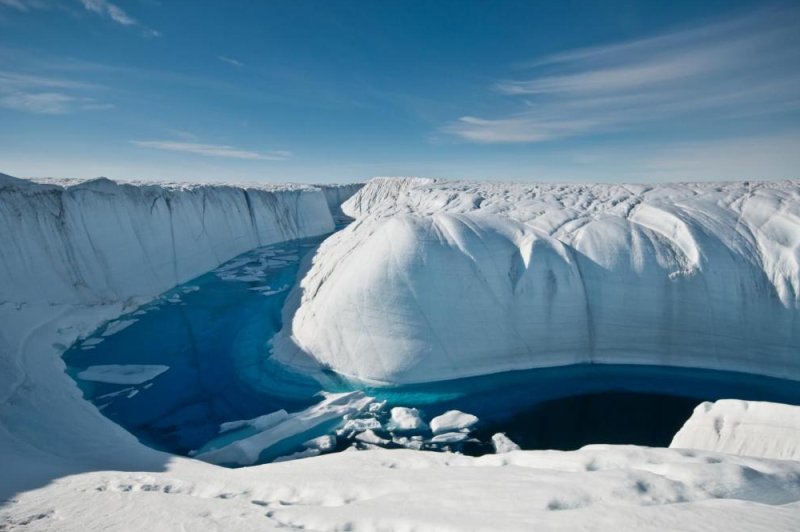A stream of meltwater carves through Greenland's ice sheet, part of what researchers say is an accelerating rate of ice loss globally. Photo by Ian Joughin/Leeds University
Jan. 25 (UPI) -- A new survey of ice loss around the globe suggests the rate at which the planet's ice sheets and glaciers are melting is rapidly accelerating.
According the new analysis, detailed Monday in the journal Cryosphere, Earth lost roughly 28 trillion tons of ice between 1994 and 2017. In 1994, Earth experienced an annual loss of 0.3 trillion tons of ice. By 2017, annual losses increased to 1.3 trillion tons.
To illuminate the full scope of the problem, researchers compiled decades of satellite data on ice losses happening in different parts of the world.
The survey combined data on 215,000 mountain glaciers, as well as polar ice sheets in Antarctica and Greenland. Scientists also accounted for sea ice losses, as well as melting along the ice shelves extending off the coast of Antarctica.
"Over the past three decades there's been a huge international effort to understand what's happening to individual components in Earth's ice system, revolutionized by satellites which allow us to routinely monitor the vast and inhospitable regions where ice can be found," lead study author Thomas Slater said in a news release.
"Our study is the first to combine these efforts and look at all the ice that is being lost from the entire planet," said Slater, a research fellow with the Center for Polar Observation and Modeling at Leeds University.
Slater and his research partners determined that more than two-thirds of global ice losses have been driven by atmospheric warming. Since 1980, Earth's atmosphere has warmed by an average of 0.46 degrees Fahrenheit per decade.
Just less than a third of ice losses recorded over the last 30 years have been driven by ocean warming. During that time, the planet's oceans have warmed by an average of 0.21 degrees Fahrenheit per decade.
The data showed all kinds of ice, including glaciers and ice sheets, have suffered significant losses since 1994, but Arctic sea ice and Antarctic ice shelves accounted for the most dramatic declines.
"Sea ice loss doesn't contribute directly to sea level rise but it does have an indirect influence," said co-author Isobel Lawrence, research fellow at the Center for Polar Observation and Modeling. "One of the key roles of Arctic sea ice is to reflect solar radiation back into space which helps keep the Arctic cool."
"As the sea ice shrinks, more solar energy is being absorbed by the oceans and atmosphere, causing the Arctic to warm faster than anywhere else on the planet," Lawrence said. "Not only is this speeding up sea ice melt, it's also exacerbating the melting of glaciers and ice sheets which causes sea levels to rise."
Land-based ice also suffered large losses, with mountain glaciers losing 6.1 trillion tons between 1994 and 2017. Greenland's ice sheet lost 3.8 trillion tons, while the Antarctic ice sheet lost 2.5 trillion tons. In total, these losses contributed 1.37 inches to sea level rise.
Scientific efforts to understand and predict sea level rise have largely focused on polar ice sheets, but mountain glaciers are disappearing at alarming rates.
Glaciers in the Alps are projected to be 90 percent melted by the end of the century, and melting glaciers in the Himalayas have increased the risk of glacial lake outburst floods.
"As well as contributing to global mean sea level rise, mountain glaciers are also critical as a freshwater resource for local communities," said co-author Inès Otosaka, postdoctoral researcher at the Center for Polar Observation and Modeling. "The retreat of glaciers around the world is therefore of crucial importance at both local and global scales."















